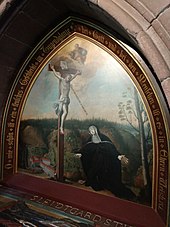Luitgard von Wittichen
Luitgard von Wittichen (* 1291 in Schenkenzell in the Black Forest ; † October 16, 1348 in Wittichen Abbey near Schenkenzell) was a German mystic and founder of the monastery .
life and work
Luitgard (also: Lutgard) von Wittichen came from a simple, rural background. At the age of twelve she was accepted into a beguinage in Oberwolfach im Wolftal , where she lived in poverty for 20 years. Through an apparition of Christ she was given the task of founding a monastery. She went on begging trips that took her to Tyrol and northern Switzerland to raise funds for the founding of a monastery. She was treated ungraciously by the Dukes of Teck at the nearby Schiltach Castle , while the Lords of Geroldseck at Schenkenburg were fond of her. In 1324 Luitgard moved to the Wittichertal and founded a hermitage for himself and 33 other womenas a community of Terziarerinnen , which was later recognized as the Wittichen Clare monastery . She derived the number from the 33-line Canticle of the Sun , a prayer by Francis of Assisi , but the number of women doubled during their lifetime. She was the abbess of the monastery until her death.
Luitgard cared for plague sufferers before she succumbed to the epidemic. She is venerated in Central Baden as a " popular saint ", although she was never beatified or canonized. The worship culminates on October 16, the day of her death. The Luitgart Festival takes place in Wittichen on the second Sunday in October. Luitgard is said to have studied the writings of Meister Eckhart and Heinrich Seuse . The founder of the monastery, described as charismatic, is - from our current perspective - an emancipated woman.
Her spiritual father, the priest Berchtold von Bombach, wrote a biography of the founder of the monastery as early as 1350. According to tradition, when the coffin was opened in 1629, her brain was found completely intact, a phenomenon that neither doctors nor chemists could explain at the time and which, as a “miracle”, triggered worship and pilgrimages.
The St. Luitgard nursing home in Oberwolfach is named after her.
literature
- Médard Barth: The blessed Luitgard von Wittichen (1292-1249) and the hermit of Rappoltsweiler . In: Archive for Alsatian Church History 16 (1943), pp. 45–54 Internet Archive .
- Johannes Gatz: Wittichen / Black Forest. Terziarinnen - Poor Clares . In: Alemannia Francicana Antiqua 18 (1973), pp. 127–242 (only the bibliography in the Internet Archive )
- Berthold von Bombach, Arnold Guillet : The life of the holy Luitgard von Wittichen (1291-1348), the saint of the womb . Reprint: Christiana, 1976, ISBN 978-3-7171-0651-7 .
- Josef Krausbeck: The Wittichen monastery in the Black Forest . In: Die Ortenau 58 (1978), pp. 455-469 UB Freiburg
- Gertrud Jaron Lewis, Frank Willaert, Marie-José Govers: Bibliography on German women's mysticism in the Middle Ages . Verlag Schmidt, 1989, p. 248, ISBN 978-3-503-02276-2 .
- Irmtraud Just: The Vita Luitgart von Wittichen: Text of the Donaueschingen Codex 118 . Peter Lang, 2000, ISBN 978-3-906765-34-1 .
- Peter Dinzelbacher : German and Dutch mysticism of the Middle Ages . Berlin 2010, register under the name.
- Nicole Eichenberger: Donor memoria, Franciscan zeal and poetic edification: Berthold von Bombach's life of the blessed Luitgart von Wittichen and its reception in the early modern period . In: Oxford German Studies 43 (2014), pp. 400–419
Web links
- Literature by and about Luitgard von Wittichen in the catalog of the German National Library .
- Website of the community of Schenkenzell .
- Website from Heiligenlexikon.de
- Essay from 1905 (French)
swell
- geschichtsquellen.de
- Manuscript census with links to the digital copies of the two former Donaueschingen manuscripts
- Writing by Unglert 1636
- Rottweiler print by Johann Carl Demuth 1734
- Luitgarten Book 1878
Individual evidence
- ^ Hugo Schneider, Castles and Palaces in Central Baden . Historical Association for Central Baden 1984, p. 461
- ↑ Ulrich Gaier, literature from the Neckar to Lake Constance 1000-1800 . Volume 3, part 1, p. 402, Verlag Oberschwäbische Elektrizitätswerke (OEW) 2003, ISBN 978-3-86142-304-1
| personal data | |
|---|---|
| SURNAME | Luitgard von Wittichen |
| ALTERNATIVE NAMES | Lutgard of Wittichen |
| BRIEF DESCRIPTION | German mystic and founder of a monastery |
| DATE OF BIRTH | 1291 |
| PLACE OF BIRTH | Schenkenzell , Black Forest |
| DATE OF DEATH | October 16, 1348 |
| Place of death | Wittichen Abbey near Schenkenzell , Black Forest |
